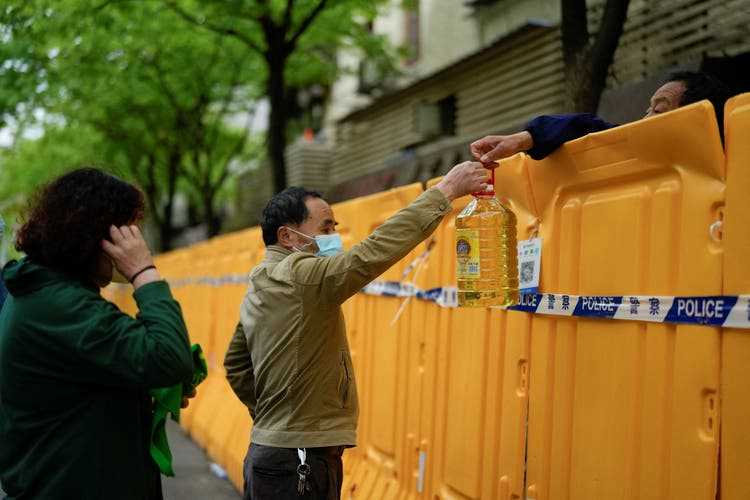Matjaz Tancic
Some Shanghainese are allowed back on the streets and almost only meet delivery men. Others have been stuck for weeks, fearing the quarantine centers more than the coronavirus.
Wanyi is lucky: she can leave her block of flats again. “There are mainly delivery men on the streets, as well as a few people from other housing estates,” says the 29-year-old from Shanghai on the phone. She does not want to give her last name. The restaurants and shops in her Changning district are closed, only general stores sell their goods through the window. “It feels like I’m out of lockdown, but the whole city is still in lockdown,” says Wanyi. “So practically nothing has changed.”
The eastern part of Shanghai has been in strict lockdown since the end of March, as has the western part, where Wanyi lives since April 1 – a total of 25 million inhabitants. According to the Japanese bank Nomura, at least 45 cities with 373 million inhabitants are now in a partial or complete lockdown across China, around a quarter of the total population. Often only apartment blocks in which there has not been a single Covid 19 case for two weeks are allowed to reopen. In Wanyi’s building, the opening came even a few days earlier. “It has been unofficially open again since Sunday, and officially since Wednesday.”
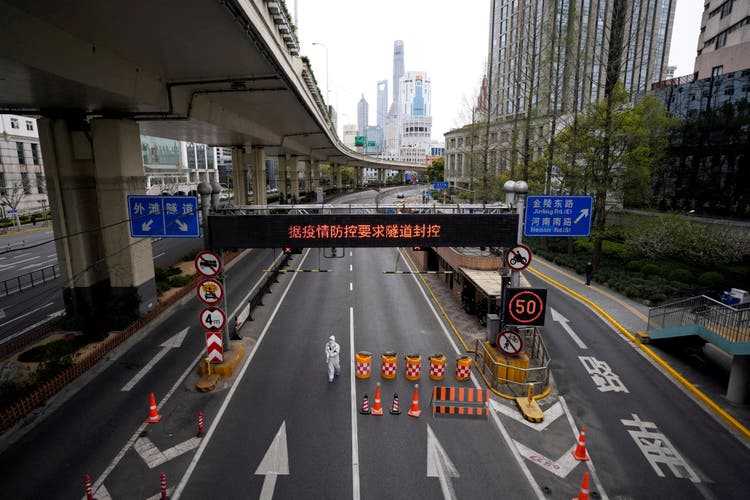
The lockdown in Shanghai began on March 28th in the eastern part of the city, followed by the western part on April 1st.
The early opening, Wanyi believes, is thanks to young, open-minded people in the relevant Communist Party neighborhood committee. These committees have gained great power across the country through the zero-Covid policy. They are the last link in the Beijing-province-city-district chain of command and determine the specific rules: which building may open or must close, who may return to their apartment from another province and who must be isolated for how long.
“There are no transparent rules, it depends on the individual,” says Wanyi. In other neighborhood committees, for example, there are “these old, communist volunteers” who implement the guidelines one-to-one – or issue even stricter restrictions. There are reports from Shanghai that some committees are not allowing deliveries of fruit or vegetables to residents because the coronavirus may be on uncooked food.
A good two weeks after the start of the lockdown, many Chinese continue to report missing food on social networks. Apparently, migrant workers and domestic help are particularly affected. They are often primarily registered with the domicile control (hukou) of their hometown or not registered at all in Shanghai, which means they can slip through the grid when it comes to food allocation by the neighborhood committees. Older people who are not very familiar with ordering apps and chat groups for bulk purchases also have a hard time.
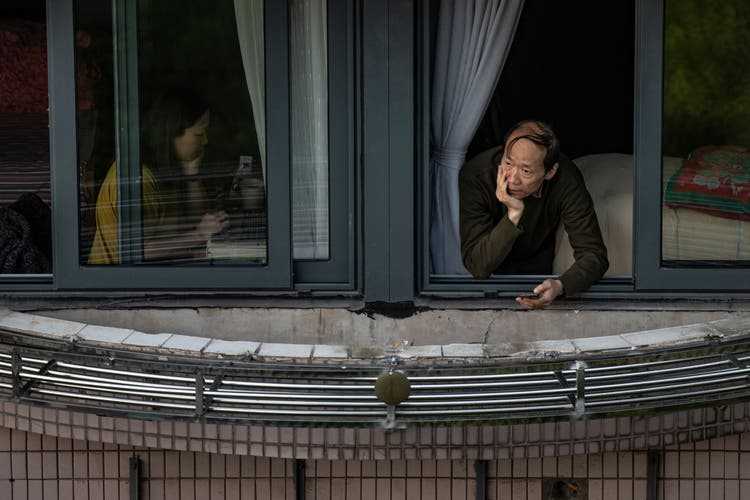
Two Shanghainese in lockdown on April 7th.
In addition, many logistics employees are stuck at home. Truck drivers are only allowed to drive into certain quarters and need permits to do so. Around Shanghai and many other places in the country, there were roadblocks on highways at least until the beginning of the week because cities and provinces fear incoming infected people. The central government demanded an end to the lockdown – and posts about it disappeared from social media.
Despite this, videos that have been distributed millions of times show courageous individuals in Shanghai shouting out their anger or describing their desperate situation to officials. “Fuhrer!” a man shouts from his window to a group of suits standing on an empty street inspecting a settlement; the salutation is common in China for political leaders. The suits turn to the man, he continues to call: “We don’t have anything here anymore, it’s impossible to buy anything, what should we do?”
This ‘shouting warrior’ is praised on WeChat today for shouting out to visiting officials that they can’t get food, they can’t order food, they don’t know what’s going on. Literally making his voice heard for the entire community. #Shanghai pic.twitter.com/4r60gBegQ5
— Manya Koetse (@manyapan) April 13, 2022
The suits continue to approach him, the man apparently feels encouraged. “We also have no idea how many positive cases there are in our settlement. The neighborhood committee has never made this public. How are we going to solve this?” A second video from a different perspective appears to show the same man being walked down the street by people in hazmat suits and yellow fluorescent vests worn by the police is carried away.
Many Shanghainese seem to be more afraid of the corona measures than of the virus. A man who wants to remain anonymous tells us on the phone that he tested positive in one of the mandatory tests a good ten days ago. He ignored calls to authorities because he didn’t want to end up in one of the makeshift quarantine centers to which every infected person is usually sent for weeks. According to eyewitness reports and photos, thousands of people sometimes live close together in exhibition halls with the bright ceiling light on all the time. Showers and drinking water seem scarce in a center it rained through the roof this week.
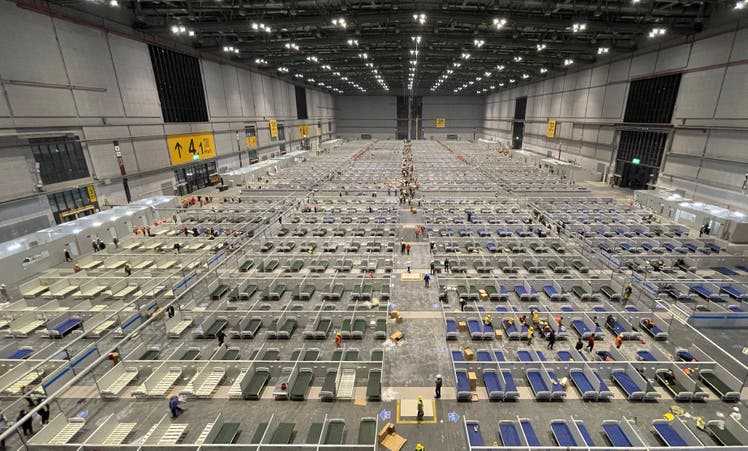
Workers convert an exhibition hall into Shanghai’s largest makeshift hospital on April 9.
Shanghai has reported more than 300,000 cases since March 1. The vast majority of them are said to have no symptoms, it is said that there are only 9 patients with severe courses. Despite the lockdown, the number of infections has continued to rise almost constantly, according to the authorities mainly due to infections within households.
The man in question also fears that because of his positive test, all his neighbors in the 30 or so apartments in the building will have to stay in lockdown for another two weeks. Finally, the local disease control authority added him as a “friend” on the WeChat network – the cell phone numbers linked to WeChat are known to the authorities through various mandatory apps for Covid-19 monitoring. The man accepted the friend request, the authorities announced that a tester would visit, but he didn’t come.
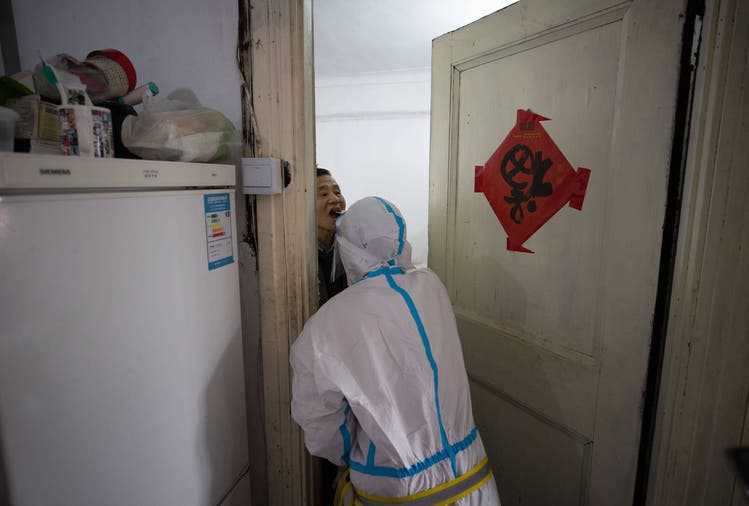
This man in Changning district is being tested for Covid-19 at home.
The Shanghai authorities are obviously still overwhelmed. Another Shanghai resident, who wished to remain anonymous, says there was an infected person in an apartment with 17 people in his block of flats earlier this month. One roommate after the other had tested positive, but the authorities only picked up the last infected person this week. His block of flats has been in lockdown since March 14th. “I’m losing hope that this will open again soon. It will probably last until May.”
